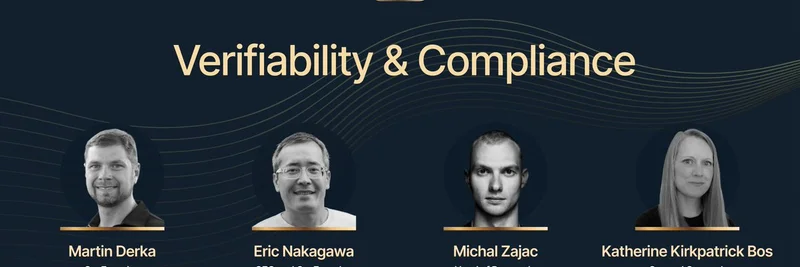In the fast-paced world of blockchain, where meme tokens often steal the spotlight with their viral hype and community-driven vibes, there's a growing need for solid foundations like verifiability and compliance. These aren't just buzzwords—they're the keys to unlocking institutional adoption and ensuring that even the wildest meme projects can thrive without running afoul of regulations or trust issues.
Recently, Nethermind, a leading engineering and research firm focused on Ethereum and Starknet, highlighted this in a tweet quoting the Ethereum NYC account. They emphasized how verifiability and compliance are vital for scaling blockchain to institutional levels. Nethermind's Head of Research, Michal Zajac (@mpfzajac), was set to share their insights at the NextFin Summit during Ethereum NYC on August 12, 2025. They also invited folks to visit their booth for more chats.
Here's the original tweet from Nethermind:
Verifiability and compliance are essential for making blockchain work at an institutional scale. @mpfzajac will share Nethermind’s perspective at @ethereum_NYC NextFin Summit.
Visit our booth to continue the discussion.
This was in response to a post from Ethereum NYC, which announced a panel discussion on the same topic:
Martin Derka, @ericnakagawa, @mpfzajac , and @kkirkbos discuss verifiability and compliance.
Learn how they are building the trust in Web3
The panel brought together some heavy hitters: Martin Derka (Co-Founder of Zircuit), Eric Nakagawa (CEO and Co-Founder of Self Protocol), Michal Zajac from Nethermind, and Katherine Kirkpatrick Bos (General Counsel at StarkWare). It's fascinating to see how these experts are tackling trust in Web3, especially with technologies like zero-knowledge proofs (ZKPs)—a cryptographic method that lets you prove something is true without revealing extra details, perfect for privacy in identity verification.
What makes this particularly intriguing for meme token enthusiasts is Eric Nakagawa's involvement. If you're into internet culture, you might recognize him as the co-creator of "I Can Has Cheezburger?"—the site that kickstarted the lolcats phenomenon and essentially birthed modern memes back in 2007. Now, he's deep in Web3 with Self Protocol, a privacy-first identity platform using ZKPs to verify users without compromising data. Imagine applying this to meme token communities: proving you're a real human holder without doxxing yourself, or ensuring compliant airdrops that avoid bots and sybils. It's a game-changer for making meme projects more legit and attractive to bigger players.
The event itself, Ethereum NYC's NextFin Summit, was co-hosted by organizations like the Ethereum Ecosystem Fund and Etherealize, with partners including the Decentralization Research Center. Sponsors ranged from Nethermind and Zircuit to Chainlink and Uniswap Foundation— a who's who of blockchain innovators.
For meme token creators and traders, this discussion underscores a shift. While memes thrive on fun and virality, adding layers of verifiability—like transparent smart contracts or compliant token launches—can help dodge rugs, build lasting communities, and even attract institutional capital. Think about how ZK tech could verify meme coin ownership for exclusive drops or governance without privacy leaks.
Nethermind's push here aligns with their work on Ethereum clients and Starknet solutions, where scalability and security are paramount. If you're building or investing in meme tokens on Ethereum or its L2s, keeping an eye on these compliance trends could be the edge you need.
Events like this remind us that blockchain's future isn't just about hype—it's about building trust that lasts. Whether you're a dev, trader, or just a meme lover, staying informed on verifiability can help you navigate the evolving Web3 landscape. Check out the Ethereum NYC site for more summit recaps, and follow Nethermind for ongoing insights.


